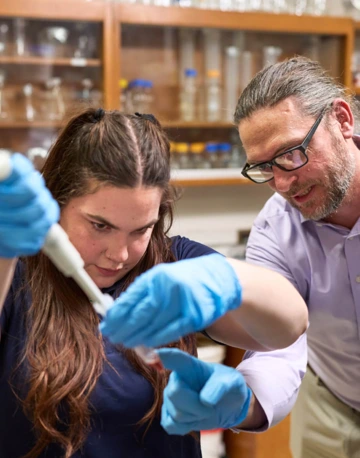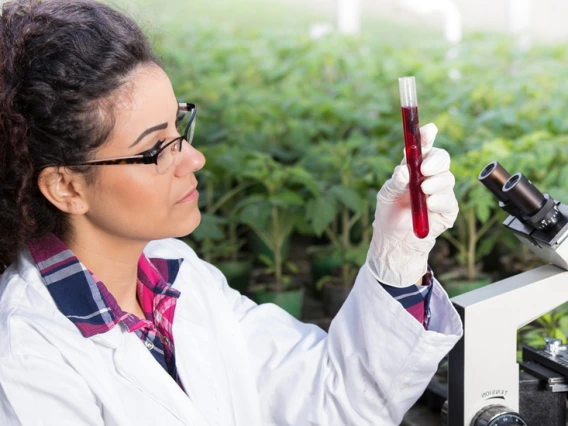Science
Bachelor of Arts
Bachelor of Science
Quick Facts

The College of Science is offering a Bachelor of Arts (BA) and a Bachelor of Science (BS) in Science.
Both degrees meet you where you are in your education and career, allowing for a flexible program where you learn the basic knowledge of the foundations of various scientific disciplines that you can easily pair with a complementary degree. The BS in Science provides additional training in foundations in science and scientific thinking.
These interdisciplinary degree programs emphasize biological and physical sciences you may utilize in intersectional fields such as education, policy, law, journalism, business, development, economics, and more. They will also provide a basic STEM background for medical and health services managers, medical assistants, natural sciences managers, and entry-level science technicians.
You may choose from a variety of emphases to tailor your science education to your specific interests. Gain a foundation in science that will prepare you as an adaptive problem solver and enable you to drive social, cultural, and economic change.
As a Science BA student, you must take calculus and four semesters of another language. You must also complete five upper-division electives with at least three courses in one area.
As a BS in Science student, you must take calculus and two semesters of another language. You must also complete eight electives with at least four courses in one area.
In addition to writing, math, language, and general education requirements, you will take core courses in statistics, introductory biology, introductory chemistry and physics, as well as in one of several areas of emphasis, including earth systems and sustainability, genetics and molecular biology, biochemistry, ecology, evolution and animal behavior, psychology, neuroscience, and cognitive science.
● The level of math required for the BA in Science program is MATH 113
● Math requirements for the BS in Science program include Math 122A, Math 122B, First-semester Calculus, or Math 125 Calculus
● Students in both programs will take a capstone course: SCI 498
*Residents of some U.S. Territories may not be eligible. Please see our Eligibility & State Authorization page for more information.
In either the BA or BS, you will take four introductory science courses, at least one from each of biology, chemistry, and physics, a statistics course, and two additional courses that are prerequisites for taking upper-division electives in one or more emphases.
BA in Science: You may choose between PHYS 102 & 181 or PHYS 141. For the statistics requirement, you may take Math 263 or PSY 230.
BS in Science: For the statistics requirement, you may choose to take Math 263 or PSY 230.
The curriculum for this program includes:
Learn about the cell and its properties, basic genetics, the immune system, and recombinant DNA technology with illustrations from bacteria, plants, animals, and humans with a lab designed to complement what students learn in the lecture portion of the course.
Study the origin, diversity, and evolution of life, focusing on the physiology of plants, animals, and organ systems. You will explore the processes of microevolution and macroevolution, animal behavior, and the ecology of populations and communities, emphasizing biotic interactions and biogeography. The lab complements what you learn in the lecture portion of the course.
This course uses the Quantitative Approach with a lab. You will learn about the central principles of modern chemistry using a quantitative atoms-first approach, and the lab is designed to complement what you learn in the lecture portion of the course.
Learn about the motion of particles in one and two dimensions, forces, Newton's laws, energy, momentum, angular momentum, and conservation laws, gravitation, fluids: Archimedes and Bernoulli, mechanical waves, sound, temperature, heat, heat engines, and laws of thermodynamics in this introductory course without calculus, for liberal arts students and students emphasizing the biological sciences. The lab complements what you learn in the lecture portion of the course.
This course introduces you to Newtonian mechanics, and you will learn about the statics and dynamics of point particles, rigid bodies, and fluids. Topics include vector algebra, projectile, and circular motion; Newton's Laws, conservation of energy, collisions, and conservation of momentum; rotational dynamics and conservation of angular momentum; statics, harmonic oscillators and pendulums; gravitation and Kepler's Laws, fluid statics and dynamics.
This is a freshman-level course in the fundamental properties of light and heat and related applications such as optical instruments and heat engines. It introduces you to the propagation of light and heat. Topics include temperature scales and heat, laws of thermodynamics, basic kinetic theory of gases, heat engines, elementary wave theory and sound, light as an electromagnetic wave, geometrical optics, lenses and mirrors, physical optics, diffraction and interference, and optical instruments.
Learn to characterize data in terms of distributions, measures of center and spread, scatterplots, nonlinear models and transformations, correlation, regression, design experiments using models from probability, discrete and continuous random variables, normal distributions, sampling distributions, the central limit theorem and apply statistical inference; confidence intervals and test of significance, t procedures, inference for count data, two-way tables and chi-square procedures, inference for regression, and analysis of variance.
Learn to apply statistics to data collected in experiments and evaluate scientific hypotheses to answer questions such as “Does sleep improve memory?” and “Does having friends improve mental health?” Learn how to apply the core statistical tools in science, such as t-tests, ANOVA, regression, and Chi-square tests in controlled scientific experiments.
Outcomes
Skills
Earning your Bachelor of Arts, Bachelor of Science in Science will build core skills, including:
- Application of scientific reasoning
- Basic laboratory skills
- Communication of scientific knowledge
- Foundational knowledge in online group projects
- Knowledge & understanding of scientific literature
- Scientific reasoning skills
- Written & oral skills











